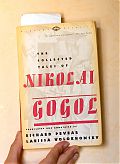
Nikolai Gogol
The Overcoat
Warmth is, as Simone Weil writes, a “need for the life of the body,” just like food, just like sleep. Without these three necessities life remains in a hopeless flounder for basic survival and the struggle to keep body well limits the potentials for functions beyond. When Akaky Akakievich went to Petrovich to see about the patching up of his thread-bare “housecoat” it was foremost a matter of warmth.
The Overcoat by Nikolai Gogol is the most masterful short story I have ever read—I do not consider The Third or Fourth Day of Spring to be a short story and so Gogol takes his righteous place. That Gogol came before Dostoevsky I do not doubt one bit by the simple overflow and poignant resound of Gogol’s words. The Overcoat has the power to pale every contemporary short story, whether online or in print, pale into a white white state of superficial meaninglessness. The supernatural, for Gogol, is not only reserved for dreams; the sympathy for Akaky Akakievich is so heart rending that it almost hurts; the sadness comic and the social commentary still relevant; St. Petersburg is alive now as it was then. The Overcoat takes up in my mind a large large girth of a large large work.
The brilliance is somewhere in the severe disparity of Akaky Akakievich, his lack-luster life, the simple man devoted almost unbeknownst to himself, to his clerical work. The brilliance is in the redemption to a temporary “higher state” through thoughts and eventual actuality of the new overcoat, tailored by the drunkard Petrovich. The life of Akaky Akakievich before the overcoat is as harsh as I imagine any Russian winter to be and when he was finally able to wear the coat, there came a short spring. He walked like a new man, maybe a man for the first time, existing outside of his “usual” doldrums schedule; he became aware of his surroundings, the street, the people, aware that he too was a part of it and he knew that life was more than the copying of given documents.
Don’t mistake me, I don’t think that the veiled pleasure was solely unveiled through the acquisition of warmth or a good overcoat. Akaky Akakievich endured physical suffering (and mental turmoil) for the overcoat’s purchase, he went without food in the evenings and without candles for light. As he saved his money he went over the details of the overcoat, he brooded over collars, he fingered materials, he expanded his visions. And finally, when he was able to handle Petrovich’s handiwork and drew his arms through the thick sleeves, when he wrapped the heavy material around himself, the pockmarked, introverted man became happy and I was led to believe, really happy for the first time in his life.
For the whole of that day was like the greatest festive holiday.
Perhaps that’s why such happiness couldn’t last long for Akaky Akakievich and the rest of the story is spent hurtling him into a more despondent state than he was before the coat. More sad than touching. The ending was necessary as a savior, for the luckless man couldn’t have been left with his pine box hovering over the frozen Russian earth.
The singular worth of Akaky Akakievich’s overcoat exceeds all those overcoats found on hangers in any modern department store or shop window. Worth is calculated by the need of each man covered. Fruitful acquisition, for most of us, is our death-dealing right, so much so that the purpose behind each purchase is hardly thought about at all. Maybe, in the cooler light of the coming “crisis” all that will change. Maybe, cold will taste like desperation, but that’s not a good thing either. To have and to be thankful is the best way. Thank you! Thank you!
Though warmth is a need for the “life of the body,” in our world of rich and poor, it is not freely given. When Akaky Akakievich, the have-not, became the have, he did not fly into a fit of power but his soul lightened and he was given beauty perhaps for the first time. With a humble pride he walked out the door, warm, as we all should be.
And, because we are all ultimately self-preserving: hip hooray! I got an overcoat! When the icy wind comes cutting down from the mountains I can pull the warmth around me tight. No longer will I have to fight and clench my body against the Mediterranean cold. I’m warm! Though, I don’t wear my overcoat as Akaky Akakievich did, I think there is something in it of pride and comfort. Really, there’s nothing like the bliss of being warm!
Note: In searching online for anything making interesting mention of The Overcoat I cam across the animator Yuriy Norshteyn, who has been creating the film since 1981. Ten minutes were completed in two years. Watch the Tale of Tales, it is a beautiful and moving vision.
Commentary for The Overcoat
· · · · · · · · · · · · · · · · · · · ·
1 On Tuesday 23 December 2008 Khendra wrote:
My favorite story. I’m basically the real-life, female version of Akakievich..heh.